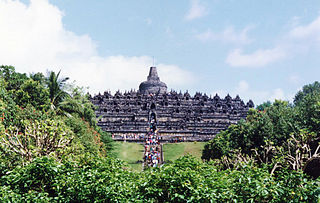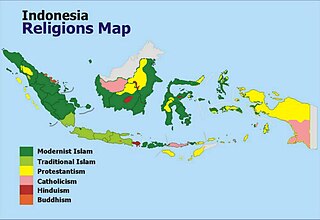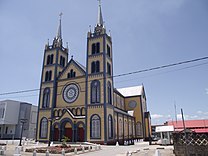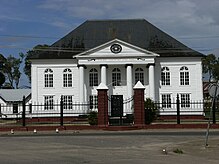
This is a demography of the population of Suriname, including population density, ethnicity, education level, health of the populace, economic status, religious affiliations, and other aspects of the population.
Religion in Canada encompasses a wide range of beliefs and customs that historically has been dominated by Christianity. The constitution of Canada refers to God and the monarch carries the title of Defender of the Faith, however Canada has no official church and the government is officially committed to religious pluralism. Freedom of religion in Canada is a constitutionally protected right, allowing individuals to assemble and worship without limitation or interference.

Kejawèn, Kejawan, or Kajawan is one of the two Javanism folk religious denominations, alongwith Kapitayan. In Kejawèn Javanism, the form of spiritual polytheistic worship is apparent.

Javanism, or Javanese folk religion is an umbrella term referring to the main native Javan folk or ethnic religion, traditionally adhered by the main Javan ethnic, invented and originally practiced in the central–southern hemisphere regions of the Indonesian island of Java. The Javanism has two main religious denomination, namely Kapitayan and Kejawèn. Javanism is one of the legal recognized folk religions in its own origin country (Indonesia), as well as another countries with significant Javanese diaspora population, such as Suriname in South America. Javanism has complex religious virtues and values deeply rooted from the ancient Javanese cultural traditions and philosophy. Adherents of Javanism are called Javanists.

Several different religions are practised in Indonesia. Indonesia is officially a presidential republic and a unitary state without an established state religion. Indonesia has the world's largest Muslim population and the first principle of Indonesia's philosophical foundation, Pancasila, requires its citizens to state the belief in "the one and almighty God". Although, as explained by the Constitutional Court, this first sila of Pancasila is an explicit recognition of divine substances and meant as a principle on how to live together in a religiously diverse society. However, blasphemy is a punishable offence and the Indonesian government has a discriminatory attitude towards its numerous tribal religions, atheist and agnostic citizens. In addition, the Aceh province officially applies Sharia law and is notorious for its discriminatory practices towards religious and sexual minorities. There are also Islamic fundamentalist movements in several parts of the country with overwhelming Muslim majorities.

Christianity is the predominant religion in Uganda. According to the 2014 census, over 84 percent of the population was Christian, while about 14 percent of the population adhered to Islam, making it the largest minority religion. Anglicanism and Catholicism are the main Christian denominations in the country.

Religion in Austria is predominantly Christianity, adhered to by 68.2% of the country's population according to the 2021 national survey conducted by Statistics Austria. Among Christians, 80.9% were Catholics, 7.2% were Orthodox Christians, 5.6% were Protestants, while the remaining 6.2% were other Christians, belonging to other denominations of the religion or not affiliated to any denomination. In the same census, 8.3% of the Austrians declared that their religion was Islam, 1.2% declared to believe in other non-Christian religions, and 22.4% declared they did not belong to any religion, denomination or religious community.

The dominant religion in Slovenia is Christianity, primarily the Catholic Church, which is the largest Christian denomination in the country. Other Christian groups having significant followings in the country include Eastern Orthodoxy and Protestantism (Lutheranism). Islam, Judaism and Hinduism are small minorities in Slovenia. About 18% of the population are either agnostic or atheist.
Religion in South America has been a major influence on art, culture, philosophy and law and changed greatly in recent years. Roman Catholicism has rapidly declined. Most of this is due to the growth of Protestantism, particularly evangelical Christians. A smaller number of South Americans are also beginning to identify as irreligious. Sizeable adherents of other religions are also present, including of various indigenous religions.
According to various polls, the majority of Kazakhstan's citizens, primarily ethnic Kazakhs, identify as Sunni Muslims. In 2020, Shia Muslims made up 0.55% of the population.
The Turkmen of Turkmenistan, are predominantly Muslims. According the U.S. Department of State's International Religious Freedom Report for 2022,
According to U.S. government estimates, the country is 89 percent Muslim, 9 percent Eastern Orthodox, and 2 percent other. There are small communities of Jehovah's Witnesses, Shia Muslims, Baha’is, Roman Catholics, the International Society for Krishna Consciousness, and evangelical Christians, including Baptists and Pentecostals. Most ethnic Russians and Armenians identify as Orthodox Christian and generally are members of the Russian Orthodox Church or Armenian Apostolic Church. Some ethnic Russians and Armenians are also members of smaller Protestant groups. There are small pockets of Shia Muslims, consisting largely of ethnic Iranians, Azeris, and Kurds, some located in Ashgabat, with others along the border with Iran and in the western city of Turkmenbashy.
Islam is the official religion in Kuwait, and the majority of the citizen population is Muslim.
The Constitution provides for freedom of religion.

Religion in Guyana is dominated by various branches of Christianity, with significant minorities of the adherents of Hinduism and Islam.

Religion in Eritrea consists of a number of faiths. The two major religions in Eritrea are Christianity and Islam. However, the number of adherents of each faith is subject to debate. Estimates of the Christian share of the population range from 47% and 63%, while estimates of the Muslim share of the population range from 37% to 52%.

Christianity is the largest religion in Mozambique, with substantial minorities of the adherents of traditional faiths and Islam.

Christianity is the largest religion in Nauru, with Nauru Congregational Church being the largest denomination, encompassing 35.71% of the population as of the 2011 census.

Christianity is the largest religion in Venezuela, with Catholicism having the most adherents.

Estonia, historically a Lutheran Christian nation, is today one of the least religious countries in the world in terms of declared attitudes, with only 14 percent of the population declaring religion to be an important part of their daily life. This is thought to largely be a result of the Soviet occupation of Estonia in 1940, prior to which Estonia had a large Christian majority.

Mauritius is a religiously diverse nation, with Hinduism being the most widely professed faith. According to the 2011 census made by Statistics Mauritius, Hinduism is the major religion at 48.54%, followed by Christianity at 32.71%, followed by Islam 17.30% and Buddhism 0.18% in terms of number of adherents.





















